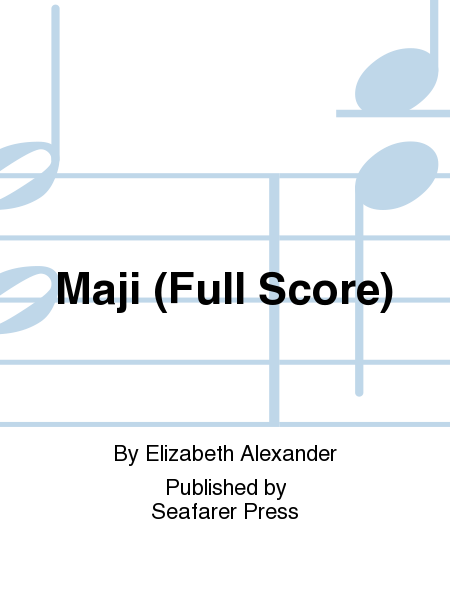Maji (Full Score)
-
Ships in 4 to 6 weeks
Details
Description
SKU: SF.SEA-079-00
Composed by Elizabeth Alexander. Water. Full score. Duration 13 minutes. Published by Seafarer Press (SF.SEA-079-00)."Maji" takes its name and inspiration from the Swahili word for water; its Arabic root "ma" means not only "water," but also "luster or splendor," often in reference to a diamond. The composer writes: "This word captured my imagination at once. There, in two short syllables, was a word which held both the beauty of water, and the suggestion that it is as precious as a jewel." True to its etymological root, "Maji" opens with sparkle, but - mirroring its fluid namesake - this bright beginning soon takes a more winding path. Each musical idea flows into the next naturally but unpredictably: picture a small creek in which water gurgles and bubbles, creates swirling eddies, shimmers from within its still surface, widens into a slow deep pool, and then suddenly rushes into a narrow channel. This image of flowing, continuous movement is the work's guiding principle; indeed, whenever musical themes make reappearances - just as in Heraclitus' ever-changing river - they are never the same twice.
Commissioned by Minnesota Philharmonic Orchestra, with commissioning partner Saint Paul Central High School; conductors Joseph Schlefke and Matthew Oyen (Minneapolis & Saint Paul, MN)Composer's Note: maji mah'-jee n. [Swahili] water This word captured my imagination at once: there, in two short syllables, was a word which held both the beauty of water, and the suggestion that it is as precious as a jewel. In my orchestral portrayal of this magical living substance, each musical idea flows into the next naturally but unpredictably: picture a small creek in which water gurgles and bubbles, creates swirling eddies, shimmers from within its still surface, widens into a slow deep pool, and then suddenly rushes into a narrow channel. This image of flowing, continuous movement is Maji's guiding principle; indeed, whenever musical themes make reappearances - just as in Heraclitus' ever-changing river - they are never the same twice.

 Share
Share